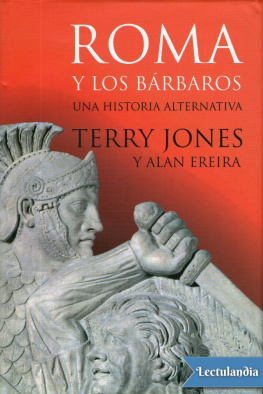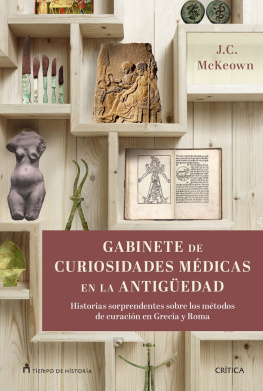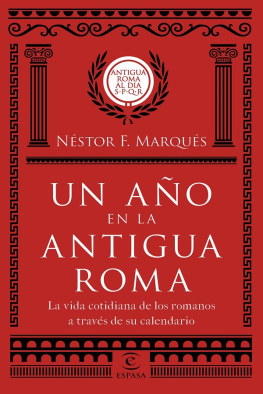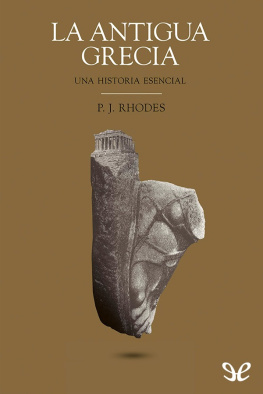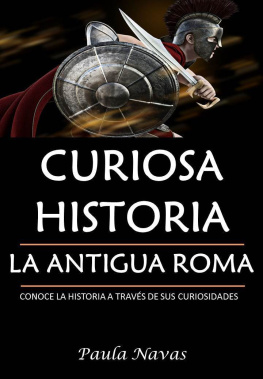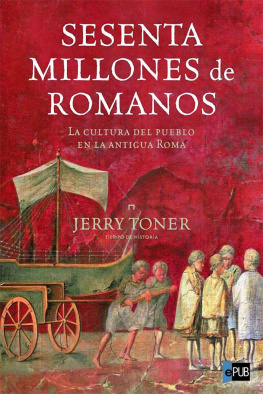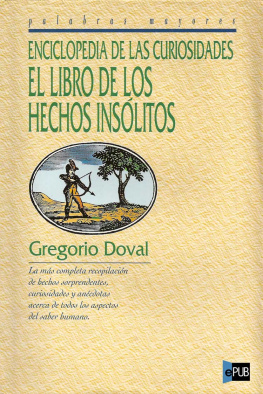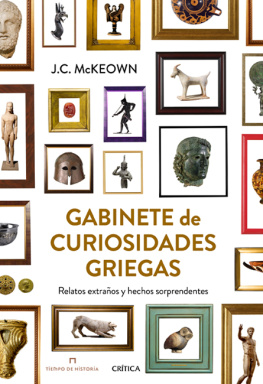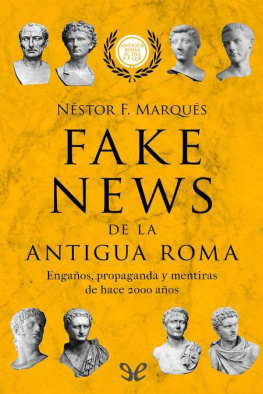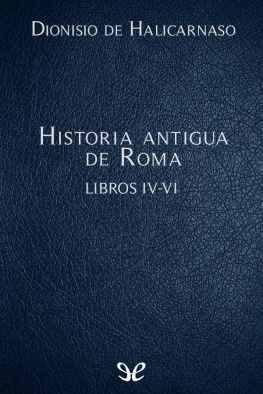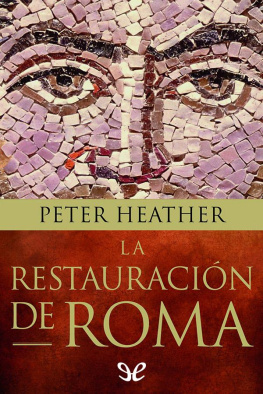
PETER JONES se educó en la universidad de Cambridge y fue profesor de Clásicos en las universidades de Cambridge y Newcastle, antes de retirarse en 1997. Durante años escribió una columna en Spectator, y es autor de numeroros libros sobre los clásicos.
Bibliografía
Baker, S., Ancient Rome: The Rise and Fall of an Empire (BBC Books, 2007).
Beard, M., y Crawford, M., Rome in the Late Republic (Duckworth-Bloomsbury, 1985).
Beard, M., The Roman Triumph (Harvard, 2007) [hay trad. cast.: El triunfo romano, Crítica, Barcelona, 2008].
—, Pompeii (Profile, 2008) [hay trad. cast.: Pompeya, Crítica, Barcelona, 2009].
—, y Hopkins, K., The Colosseum (actualizado, Profile, 2011).
Bispham, E. (ed.), Roman Europe (Oxford, 2008) [hay trad. cast.: Europa romana, Crítica, Barcelona, 2009].
Bowman, A. K., Life and Letters on the Roman Frontier: Vindolanda and its People (British Museum, 1994).
Bradley, K., y Cartledge, P. (eds.), The Cambridge World History of Slavery, vol. 1 (Cambridge, 2011).
Cambridge Ancient History (sobre todo la segunda edición), en especial los volúmenes IX-XIII (146 a. C. - 425 d. C.) (Cambridge, 1994-1998).
Cameron, A., The Last Pagans of Rome (Oxford, 2011).
Casson, L., Libraries in the Ancient World (Yale, 2001).
—, Travel in the Ancient World (Allen and Unwin, 1974).
Claridge, A., Rome: An Oxford Archaeological Guide (second ed., Oxford, 2010).
Clark, G., Augustine: The Confessions (Bristol Phoenix Press, 2005).
—, Late Antiquity: A Very Short Introduction (Oxford, 2011).
Cornell, T. J., The Beginnings of Rome (Routledge, 1995) [hay trad. cast.: Los orígenes de Roma, c. 100 a. C. -264a. C.: Italia y Roma, de la edad de bronce a las guerras púnicas, trad. de T. de Lozoya Eizdurdía, Crítica, Barcelona 1999].
Dalby, A., Empires of Pleasure (Routledge, 2000).
—, Food in the Ancient World from A to Z (Routledge, 2003).
de la Bedoyere, G., Voices of Imperial Rome (Tempus, 2000).
Dennison, M., Empress of Rome: The Life of Livia (Quercus, 2010).
Dodge, H., Spectacle in the Roman World (Bristol Classical Press, 2011).
Donaldson, I., The Rapes of Lucretia: A Myth and its Transformations (Oxford, 1982).
Dunbabin, K., Mosaics of the Greek and Roman World (Cambridge, 1999).
Eckstein, A. M., Mediterranean Anarchy, Interstate War and the Rise of Rome (California, 2006).
Eden, P. T. (ed.), Seneca: Apocolocyntosis (Cambridge, 1984).
Edwards, C., y Woolf, G. (eds.), Rome the Cosmopolis (Cambridge, 2003).
Edwards, C., Death in Ancient Rome (Yale, 2007).
Erdkamp, P. (ed.), A Companion to the Roman Army (Blackwell, 2007).
Feeney, D., Caesar’s Calendar (California, 2007).
Flower, H. I., The Cambridge Companion to the Roman Republic (Cambridge, 2004).
Garnsey, P., Ideas of Slavery from Aristotle to Augustine (Cambridge, 1996).
Goldsworthy, A., The Punic Wars (Cassell, 2000).
—, The Complete Roman Army (Thames and Hudson, 2003).
—, Caesar (Weidenfeld & Nicolson, 2006).
Hartney, A., Gruesome Deaths and Celibate Lives (Bristol Phoenix Press, 2005).
Heather, P., The Fall of the Roman Empire (Macmillan, 2005) [hay trad. cast.: La caída del Imperio Romano, trad. de T. Fernández Aúz, y B. Eguibar Barrena, Crítica, Barcelona, 2008].
Hodge, A. T., Roman Aqueducts and Water Supply (Duckworth-Bloomsbury, 1992).
Hornblower, S., y Spawforth, A. (eds.), The Oxford Classical Dictionary (3.ª ed., Oxford, 2003).
Jones, Peter, y Sidwell, Keith (eds.), The World of Rome (Cambridge, 1997).
Jones, Peter, Classics in Translation (Duckworth-Bloomsbury, 1998).
—, The Intelligent Person’s Guide to Classics (Duckworth-Bloomsbury, 1999).
—, Vote for Caesar (Orion, 2008).
Kelly, C., Attila the Hun: Barbarian Terror and the Fall of the Roman Empire (Bodley Head, 2008).
Knapp, R. C., Invisible Romans: Prostitutes, Outlaws, Slaves, Gladiators and Others (Profile, 2011).
Köhne, E., y Ewigleben, C., Gladiators and Caesars (British Museum, 2000).
Kolbert, C., Justinian: The Digest of Roman Law-Theft, Rapine, Damage and Insult (Harmondsworth, 1979).
Lane Fox, R., The Unauthorized Version: Truth and Fiction in the Bible (Viking, 1991) [hay trad. cast.: La versión no autorizada: verdad y ficción en la Biblia, trad. de C. A. Gómez Martínez, Planeta, 1992].
Langslow, D., Medical Latin in the Roman Empire (Oxford, 2000).
Lloyd, A. B. (ed.), Battle in Antiquity (Duckworth-Bloomsbury, 1996).
Mackay, C. S., Ancient Rome: A Political and Military History (Cambridge, 2004).
McLynn, F., Marcus Aurelius: Warrior, Philosopher, Emperor (Bodley Head, 2009).
Man, J., Attila: The Barbarian King who Challenged Rome (Bantam, 2005).
Mattingly, D. J., Tripolitania (Batsford, 1995).
Miles, R., Carthage Must Be Destroyed: The Rise and Fall of an Ancient Civilization (Allen Lane, 2010).
Millar, F., The Emperor in the Roman World (2.ª ed., Duckworth-Bloomsbury, 1992).
—, The Crowd in Rome in the Late Republic (Michigan, 2001).
—, (artículos recogidos en tres volúmenes) Rome, the Greek World and the East (North Carolina 2002, 2004, 2006).
North, J. A., y Price, S. R. F. (eds.), The Religious History of the Roman Empire (Oxford, 2011).
Nutton, V., Ancient Medicine (Routledge, 2004).
Ogilvie, R. M., A Commentary on Livy, Libros 1-5 (Oxford, 1978).
Opper, T., Hadrian: Empire and Conflict (British Museum, 2008).
Ormerod, H. A., Piracy in the Ancient World (Johns Hopkins, 1924).
Parry, D., Engineering in the Ancient World (Sutton, 2005).
Pott, J. A., y Wright, F. A. (tr.), Martial: The Twelve Books of Epigrams (Routledge, 1920).
Potter, D. S. (ed.), A Companion to the Roman Empire (Blackwell, 2006).
—, Rome in the Ancient World (Thames and Hudson, 2009).
Price, S., y Thonemann, P., The Birth of Classical Europe (Allen Lane, 2010).
Rauh, N. K., Merchants, Sailors and Pirates in the Roman World (Tempus, 2003).
Richardson, J. H., y Santangelo, F. (eds.), Priests and State in the Roman World (Stuttgart, 2011).
Riggsby, A. M., Roman Law and the Legal World of the Romans (Cambridge, 2010).
Rowland, I. D., y Howe, T. N. (eds.), Vitruvius: Ten Books on Architecture (Cambridge, 1999).
Salmon, E. T., Samnium and the Samnites (Cambridge, 1967).
Scarre, C., Chronicle of the Roman Emperors (Thames and Hudson, 2007).
Shelton, J., As the Romans Did (2.ª ed., Oxford, 1997).
Shirley, E., Building a Roman Legionary Fortress (Tempus, 2001).
Sommer, M., The Complete Roman Emperor (Thames and Hudson, 2010).
Stephenson, P., Constantine: Unconquered Emperor, Christian Victor (Quercus, 2009).
Stoneman, R., Palmyra and its Empire: Zenobia’s Revolt against Rome (Michigan, 1992).
Treggiari, S., Roman Marriage (Oxford, 1991).
Venning, T., A Chronology of the Roman Empire (Continuum, 2011).
Walker, S., y Higgs, P. (eds.), Cleopatra of Egypt-from History to Myth


